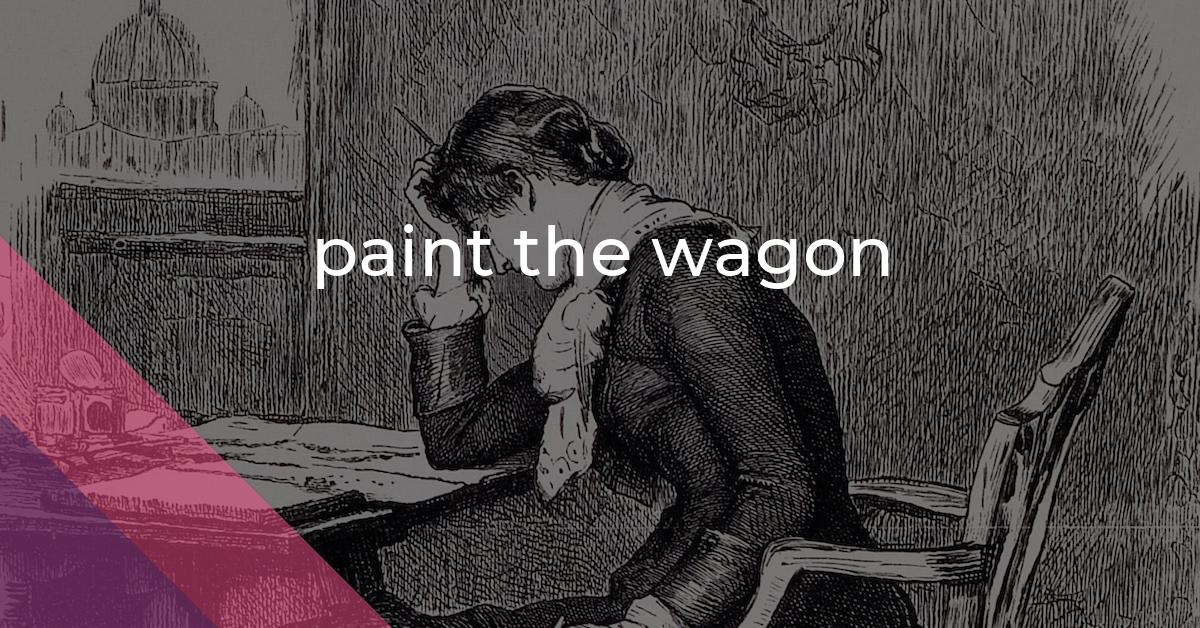paint the wagon: Idiom Meaning and Origin
What does ‘paint the wagon’ mean?
The idiom "paint the wagon" means to divert attention, usually by engaging in a secondary activity or creating a distraction, in order to avoid addressing or resolving an underlying problem or issue.

Idiom Explorer
Colorful Secrets Unveiled
The idiom "paint the wagon" has a rich history and has been used in various contexts and cultural references. Its origin is uncertain, but it has been used in American English to convey different meanings over the years. One way this idiom is used is in relation to alcoholic beverages. Another way it is used is in the entertainment industry, particularly in reference to the film "Paint Your Wagon" released in 1969. This idiom can also imply a hasty or careless approach to a task or situation.
One interesting fact about the idiom "paint the wagon" is its association with the consumption of alcoholic drinks. Back in the 19th century, it was commonly used in saloons and bars. In this context, "paint the wagon" referred to heavy drinking and excessive indulgence in alcohol. It often implied recklessness or abandon associated with excessive alcohol consumption.
Another significant aspect of this idiom is its connection to popular culture. The film "Paint Your Wagon," directed by Joshua Logan and released in 1969, played a role in popularizing the idiom. The title of the film became closely associated with the phrase and contributed to its popularity, especially in the United States. The movie's plot revolves around a gold rush town, and while the idiom "paint the wagon" is not explicitly used in the film, the title sparked curiosity about the meaning and origins of the phrase.
Additionally, "paint the wagon" can be used metaphorically to convey a hasty or careless approach to a task or situation. When someone "paints the wagon" metaphorically, it suggests a lack of attention to detail or a disregard for the consequences of their actions. This extended usage adds depth to the idiom beyond its association with alcohol.
While the exact origins of the idiom "paint the wagon" remain uncertain, its various meanings and contexts contribute to its complexity and versatility. The association with alcohol and its connection to popular culture have solidified its place in American English. Furthermore, the metaphorical usage of the idiom adds a layer of meaning that captures attention and curiosity. In the realm of idioms and language, "paint the wagon" is an intriguing and nuanced expression.
The idiom "wag the dog" shares some similarities with "paint the wagon." Both phrases are idiomatic expressions that have become part of the English language. While "paint the wagon" has a broad range of meanings, "wag the dog" specifically refers to a situation where something insignificant or less important distracts from something more important or significant.
Similarly, the idiom "fix someone's wagon" has a different meaning but shares a common connection to the wagon imagery. In this idiom, "wagon" is used metaphorically to represent a person's reputation or well-being. "Fixing someone's wagon" means to harm or undermine someone, often by damaging their reputation or causing them trouble.
Finally, the phrase "painting rocks" may not be as widely known as the other idioms discussed, but it does connect to the imagery of painting and wagons. "Painting rocks" refers to a futile or meaningless task, similar to "painting a wagon" without any practical purpose. The use of "painting" in both idioms creates a connection in their imagery and conveys a sense of fruitlessness or pointlessness.
The idiom "paint the wagon" has a fascinating history and multifaceted usage. Its association with alcohol, influence from popular culture, and metaphorical interpretations all contribute to its complexity. Additionally, the related idioms "wag the dog," "fix someone's wagon," and "painting rocks" share connections to the imagery and meanings of "paint the wagon." These idioms all add depth to the understanding and usage of idiomatic expressions in the English language.
Example usage
Examples of how the idiom "paint the wagon" can be used in a sentence:
- After years of neglect, John decided to finally paint the wagon in his backyard.
- Our team had to work overnight to paint the wagon before the big parade.
- In order to attract customers, the company hired an artist to paint the wagon with vibrant colors and designs.
More "Entertainment" idioms



